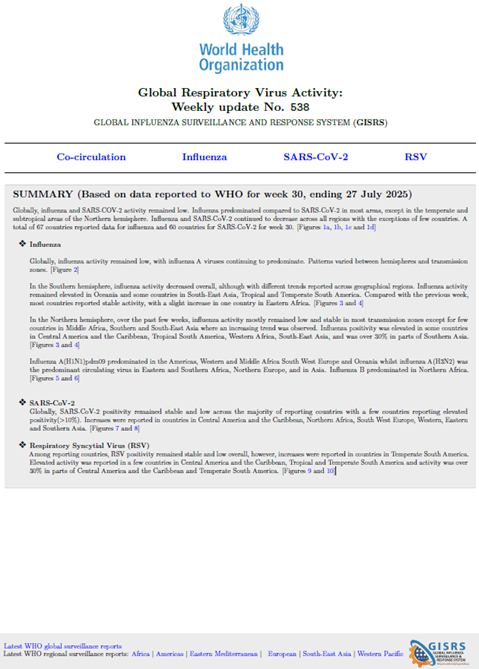Influenza Update N° 538
6 August 2025
| Emergency situation update

Overview
Published 6 August 2025 | For reporting Week 30, ending 27 July 2025
Influenza
- Globally, influenza activity remained low, with influenza A viruses continuing to predominate. Patterns varied between hemispheres and transmission zones.
- In the Southern hemisphere, influenza activity decreased overall, although with different trends reported across geographical regions. Influenza activity remained elevated in Oceania and some countries in South-East Asia, Tropical and Temperate South America. Compared with the previous week, most countries reported stable activity, with a slight increase in one country in Eastern Africa.
- In the Northern hemisphere, over the past few weeks, influenza activity mostly remained low and stable in most transmission zones except for few countries in Middle Africa, Southern and South-East Asia where an increasing trend was observed. Influenza positivity was elevated in some countries in Central America and the Caribbean, Tropical South America, Western Africa, South-East Asia, and was over 30% in parts of Southern Asia.
- Influenza A(H1N1)pdm09 predominated in the Americas, Western and Middle Africa South West Europe and Oceania whilst influenza A(H3N2) was the predominant circulating virus in Eastern and Southern Africa, Northern Europe, and in Asia. Influenza B predominated in Northern Africa.
SARS-CoV-2
- Globally, SARS-CoV-2 positivity remained stable and low across the majority of reporting countries with a few countries reporting elevated positivity(>10%). Increases were reported in countries in Central America and the Caribbean, Northern Africa, South West Europe, Western, Eastern and Southern Asia.
Respiratory Syncytial Virus (RSV)
- Among reporting countries, RSV positivity remained stable and low overall, however, increases were reported in countries in Temperate South America. Elevated activity was reported in a few countries in Central America and the Caribbean, Tropical and Temperate South America and activity was over 30% in parts of Central America and the Caribbean and Temperate South America.
Starting with report #501, the Global Respiratory Virus Activity Weekly Update included data from sentinel surveillance and other types of systematically conducted virologic surveillance. Countries, areas, and territories use a variety of approaches to monitor respiratory virus activity and data in this report may vary from surveillance reports posted elsewhere. Analyses stratified by source of surveillance is available through Respimart.
WHO Team
Global Influenza Programme (GIP)
